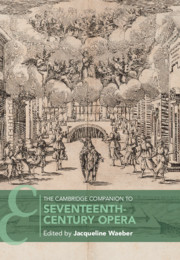Book contents
- The Cambridge Companion to Seventeenth-Century Opera
- Cambridge Companions to Music
- The Cambridge Companion to Seventeenth-Century Opera
- Copyright page
- Contents
- Music Examples
- Figures
- Tables
- Contributors
- Preface
- Chronology
- Abbreviations
- Part I The Italian Foundations
- 1 Opera Is Born
- 2 ‘…e poi le parole’
- 3 Aria, Recitative, and Chorus in Italian Opera
- 4 Opera as Spectacle, Opera as Drama
- Part II Society, Institutions, and Production
- Part III National Traditions (outside Italy)
- Further Reading
- Index
1 - Opera Is Born
The Wedding of Music and Drama in Late Renaissance Florence
from Part I - The Italian Foundations
Published online by Cambridge University Press: 08 December 2022
- The Cambridge Companion to Seventeenth-Century Opera
- Cambridge Companions to Music
- The Cambridge Companion to Seventeenth-Century Opera
- Copyright page
- Contents
- Music Examples
- Figures
- Tables
- Contributors
- Preface
- Chronology
- Abbreviations
- Part I The Italian Foundations
- 1 Opera Is Born
- 2 ‘…e poi le parole’
- 3 Aria, Recitative, and Chorus in Italian Opera
- 4 Opera as Spectacle, Opera as Drama
- Part II Society, Institutions, and Production
- Part III National Traditions (outside Italy)
- Further Reading
- Index
Summary
Acknowledging the experimental beginnings of opera and expressing high hopes for its future, Marco da Gagliano (1582–1643) thus reviews the origins of ‘such spectacles’ in the 1608 preface of his own first effort in the new genre, La Dafne, itself a reworking and expansion of the earliest completely sung music drama a decade earlier. He goes on to explain how, after a great deal of discussion concerning the way the ancients had represented their tragedies and about what role music had played in them, the court poet Ottavio Rinuccini (1562–1621) began to write the story (favola) of Dafne, and the learned amateur Jacopo Corsi (1561–1602) composed some airs on part of it. Determined to see what effect a (completely sung) work would have on the stage, they approached the skilled composer and singer Jacopo Peri, who finished the work and probably premièred the role of Apollo ‘on the occasion of an evening entertainment’ during the carnival of 1597/8 and on subsequent occasions. In the invited audience at the first performance were Don Giovanni de’ Medici and ‘some of the principal gentlemen’ of Florence.2
- Type
- Chapter
- Information
- The Cambridge Companion to Seventeenth-Century Opera , pp. 3 - 21Publisher: Cambridge University PressPrint publication year: 2022

